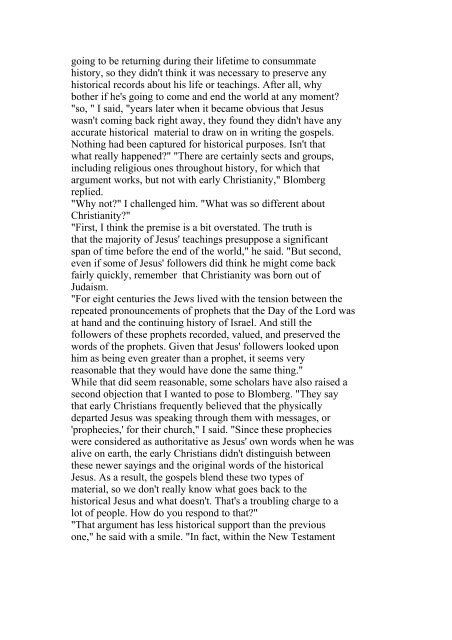The Case For Christ
The Case for Christ records Lee Strobel's attempt to "determine if there's credible evidence that Jesus of Nazareth really is the Son of God." The book consists primarily of interviews between Strobel (a former legal editor at the Chicago Tribune) and biblical scholars such as Bruce Metzger. Each interview is based on a simple question, concerning historical evidence (for example, "Can the Biographies of Jesus Be Trusted?"), scientific evidence, ("Does Archaeology Confirm or Contradict Jesus' Biographies?"), and "psychiatric evidence" ("Was Jesus Crazy When He Claimed to Be the Son of God?"). Together, these interviews compose a case brief defending Jesus' divinity, and urging readers to reach a verdict of their own.
The Case for Christ records Lee Strobel's attempt to "determine if there's credible evidence that Jesus of Nazareth really is the Son of God." The book consists primarily of interviews between Strobel (a former legal editor at the Chicago Tribune) and biblical scholars such as Bruce Metzger. Each interview is based on a simple question, concerning historical evidence (for example, "Can the Biographies of Jesus Be Trusted?"), scientific evidence, ("Does Archaeology Confirm or Contradict Jesus' Biographies?"), and "psychiatric evidence" ("Was Jesus Crazy When He Claimed to Be the Son of God?"). Together, these interviews compose a case brief defending Jesus' divinity, and urging readers to reach a verdict of their own.
Create successful ePaper yourself
Turn your PDF publications into a flip-book with our unique Google optimized e-Paper software.
going to be returning during their lifetime to consummate<br />
history, so they didn't think it was necessary to preserve any<br />
historical records about his life or teachings. After all, why<br />
bother if he's going to come and end the world at any moment?<br />
"so, " I said, "years later when it became obvious that Jesus<br />
wasn't coming back right away, they found they didn't have any<br />
accurate historical material to draw on in writing the gospels.<br />
Nothing had been captured for historical purposes. Isn't that<br />
what really happened?" "<strong>The</strong>re are certainly sects and groups,<br />
including religious ones throughout history, for which that<br />
argument works, but not with early <strong>Christ</strong>ianity," Blomberg<br />
replied.<br />
"Why not?" I challenged him. "What was so different about<br />
<strong>Christ</strong>ianity?"<br />
"First, I think the premise is a bit overstated. <strong>The</strong> truth is<br />
that the majority of Jesus' teachings presuppose a significant<br />
span of time before the end of the world," he said. "But second,<br />
even if some of Jesus' followers did think he might come back<br />
fairly quickly, remember that <strong>Christ</strong>ianity was born out of<br />
Judaism.<br />
"<strong>For</strong> eight centuries the Jews lived with the tension between the<br />
repeated pronouncements of prophets that the Day of the Lord was<br />
at hand and the continuing history of Israel. And still the<br />
followers of these prophets recorded, valued, and preserved the<br />
words of the prophets. Given that Jesus' followers looked upon<br />
him as being even greater than a prophet, it seems very<br />
reasonable that they would have done the same thing."<br />
While that did seem reasonable, some scholars have also raised a<br />
second objection that I wanted to pose to Blomberg. "<strong>The</strong>y say<br />
that early <strong>Christ</strong>ians frequently believed that the physically<br />
departed Jesus was speaking through them with messages, or<br />
'prophecies,' for their church," I said. "Since these prophecies<br />
were considered as authoritative as Jesus' own words when he was<br />
alive on earth, the early <strong>Christ</strong>ians didn't distinguish between<br />
these newer sayings and the original words of the historical<br />
Jesus. As a result, the gospels blend these two types of<br />
material, so we don't really know what goes back to the<br />
historical Jesus and what doesn't. That's a troubling charge to a<br />
lot of people. How do you respond to that?"<br />
"That argument has less historical support than the previous<br />
one," he said with a smile. "In fact, within the New Testament

















